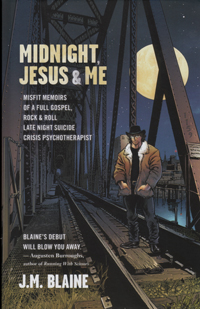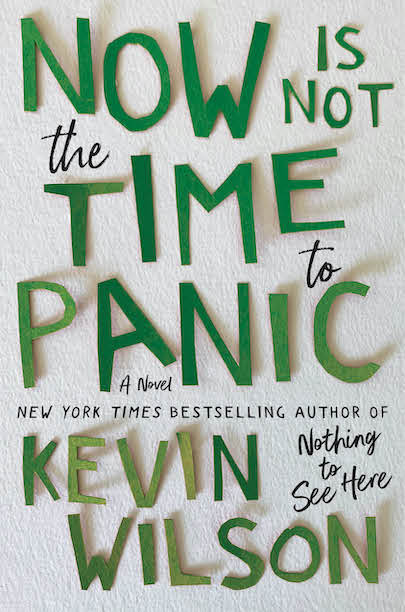The Epiphany of the Holy and the Absurd
J.M. Blaine writes about his life as a mental-health interventionist and unconventional Christian
Early in his new memoir, Nashville author J.M. Blaine responds with humor when asked about his job as a late-night crisis interventionist: “I’ve made tens of dollars in mental health,” he says, pointing to his battered Saturn. But the truth is more complex, and Midnight, Jesus & Me is a powerful work of creative nonfiction that describes Blaine’s own unusual spiritual journey. A self-described “lapsed Catholic with a bad case of magical thinking, a scatterbrained mystic who looks like a roadie from Foghat,” Blaine begins the story when he’s a roller-rink DJ and part-time rock-and-gospel musician. As his story unfolds, he becomes a mental-health professional who has seen it all and somehow managed to hold on to both his sanity and his faith.
 Written in short chapters that alternate between straightforward narrative and dreamlike prose, Midnight, Jesus & Me introduces a fascinating cast of characters, but most compelling of all is Blaine’s matter-of-fact way of relating to the down-and-out figures into whose lives he is temporarily drawn. Whether describing his stint as a tech at a psychiatric hospital, a night-shift crisis interventionist called to potentially violent scenes of chaos and confusion, or a more conventional therapist at a megachurch counseling center, Blaine presents his clients—grief-stricken and lonely, hopeless and depressed, suicidal and prone to violence—as deserving of kindness and respect even as they find themselves mired in the fallout of tragic life circumstances, chemical imbalance, substance abuse, or their own very bad decisions.
Written in short chapters that alternate between straightforward narrative and dreamlike prose, Midnight, Jesus & Me introduces a fascinating cast of characters, but most compelling of all is Blaine’s matter-of-fact way of relating to the down-and-out figures into whose lives he is temporarily drawn. Whether describing his stint as a tech at a psychiatric hospital, a night-shift crisis interventionist called to potentially violent scenes of chaos and confusion, or a more conventional therapist at a megachurch counseling center, Blaine presents his clients—grief-stricken and lonely, hopeless and depressed, suicidal and prone to violence—as deserving of kindness and respect even as they find themselves mired in the fallout of tragic life circumstances, chemical imbalance, substance abuse, or their own very bad decisions.
Blaine’s parents’ next-door neighbor can no longer hide his alcoholism. A young girl cuts herself, believing that she is a vampire. A man sits on a bridge at night, drinking and remembering his brother, who jumped to his death from the same span. Abandoned by her boyfriend, a woman crawls into the ventilation system at work and won’t come out. A homeless man receives a summons from the president via his cassette player and sets out to walk to Washington, D.C. A grief-stricken mother brandishes a .38 and tells Blaine “It’s just so hard.” A man with terminal cancer refuses further treatment against his family’s wishes and prepares himself to die. A twenty-five-year-old girl is paralyzed from the waist down after being shot by her boyfriend. It is Blaine’s job to determine whether they pose a danger to themselves or others and to take appropriate action if needed, but he regularly goes beyond what is expected, seeking to make a deeper connection, continually calling upon his faith in God to help him when he doesn’t know what to do or say next.
 It would all be too much sadness to bear if Blaine didn’t regularly break the tension with his goofy, self-deprecating, off-the-wall sense of humor. With chapter titles like “Closer to God with Cowgirl Strippers at the Coffee House College Bar,” “Black Belt Bible Monsters Meet the Tattooed Hairdresser from Hell,” and “Jesus is Alive & Well at the All-Night Kroger Off Old Hickory Road,” Blaine turns a conventional landscape into a world both unfamiliar and absurd. He also has a gift for uniquely vivid description: a prisoner wears “Hamburglar coveralls.” Singers are so talented they could perform a gospel song “that would make Chris Hitchens weep.” A woman has a face so bland she resembles “a biscuit with eyes.” A violent psychotic with a “Grease 2 pompadour” who thinks he’s the devil is dubbed “Satan Fonzarelli” just before he clocks Blaine with a folding chair. As a therapist, Blaine manages to maintain an attitude of detached professionalism during most of his interactions with patients, but at the same time he respects each one’s dignity (even when their behavior is anything but dignified), and his deft mixing of comic and tragic elements prevents the narrative from descending into sentimentality.
It would all be too much sadness to bear if Blaine didn’t regularly break the tension with his goofy, self-deprecating, off-the-wall sense of humor. With chapter titles like “Closer to God with Cowgirl Strippers at the Coffee House College Bar,” “Black Belt Bible Monsters Meet the Tattooed Hairdresser from Hell,” and “Jesus is Alive & Well at the All-Night Kroger Off Old Hickory Road,” Blaine turns a conventional landscape into a world both unfamiliar and absurd. He also has a gift for uniquely vivid description: a prisoner wears “Hamburglar coveralls.” Singers are so talented they could perform a gospel song “that would make Chris Hitchens weep.” A woman has a face so bland she resembles “a biscuit with eyes.” A violent psychotic with a “Grease 2 pompadour” who thinks he’s the devil is dubbed “Satan Fonzarelli” just before he clocks Blaine with a folding chair. As a therapist, Blaine manages to maintain an attitude of detached professionalism during most of his interactions with patients, but at the same time he respects each one’s dignity (even when their behavior is anything but dignified), and his deft mixing of comic and tragic elements prevents the narrative from descending into sentimentality.
Even as a man who identifies his life verse as Psalm 2:4 (“God sits in the heavens and laughs”), Blaine is not immune to doubt. As he explains, “I think too much. I’m too much of a contrarian. Every time I try to be spiritually confident or cool, I put my foot in the mop bucket. A part of me has always wondered if God just looks at me and shakes His head.” He also struggles with religious institutions: “I’ve never been very good at church. I like the wrong songs, the wrong Bible verses, laugh at the wrong jokes, ask the wrong questions, say amen in all the wrong places,” he writes. “Man, I don’t know. I wish I could win a five-minute phone call from God.”
By taking to heart his pastor’s admonition that “God goes with you, everywhere you go,” and believing that the people he serves are given into his care for a reason, Blaine finds within himself a capacity for understanding and tenderness even under the most desperate circumstances. “Occasionally I get the Epiphany, that slim instant when I see the scene removed from myself and realize how ridiculous and perfect it is for a misfit life like mine,” he writes. “The Epiphany of the Holy, and of the Absurd. That God still shows up in unexpected places. I wish I could cut around the edges and take this moment with me, show it to the people I love who do not understand.” What emerges is the portrait of a man of simple faith, great humor, common doubts, and uncommon heart, and readers of Midnight, Jesus & Me will likely be glad that J.M. Blaine has put his experiences down on paper. They are, quite simply, a revelation.


